Yuhang Gan
Detect Changes like Humans: Incorporating Semantic Priors for Improved Change Detection
Dec 22, 2024



Abstract:When given two similar images, humans identify their differences by comparing the appearance ({\it e.g., color, texture}) with the help of semantics ({\it e.g., objects, relations}). However, mainstream change detection models adopt a supervised training paradigm, where the annotated binary change map is the main constraint. Thus, these methods primarily emphasize the difference-aware features between bi-temporal images and neglect the semantic understanding of the changed landscapes, which undermines the accuracy in the presence of noise and illumination variations. To this end, this paper explores incorporating semantic priors to improve the ability to detect changes. Firstly, we propose a Semantic-Aware Change Detection network, namely SA-CDNet, which transfers the common knowledge of the visual foundation models ({\it i.e., FastSAM}) to change detection. Inspired by the human visual paradigm, a novel dual-stream feature decoder is derived to distinguish changes by combining semantic-aware features and difference-aware features. Secondly, we design a single-temporal semantic pre-training strategy to enhance the semantic understanding of landscapes, which brings further increments. Specifically, we construct pseudo-change detection data from public single-temporal remote sensing segmentation datasets for large-scale pre-training, where an extra branch is also introduced for the proxy semantic segmentation task. Experimental results on five challenging benchmarks demonstrate the superiority of our method over the existing state-of-the-art methods. The code is available at \href{https://github.com/thislzm/SA-CD}{SA-CD}.
Quantum Hamiltonian Descent for Graph Partition
Nov 22, 2024



Abstract:We introduce Quantum Hamiltonian Descent as a novel approach to solve the graph partition problem. By reformulating graph partition as a Quadratic Unconstrained Binary Optimization (QUBO) problem, we leverage QHD's quantum-inspired dynamics to identify optimal community structures. Our method implements a multi-level refinement strategy that alternates between QUBO formulation and QHD optimization to iteratively improve partition quality. Experimental results demonstrate that our QHD-based approach achieves superior modularity scores (up to 5.49\%) improvement with reduced computational overhead compared to traditional optimization methods. This work establishes QHD as an effective quantum-inspired framework for tackling graph partition challenges in large-scale networks.
RFL-CDNet: Towards Accurate Change Detection via Richer Feature Learning
Apr 27, 2024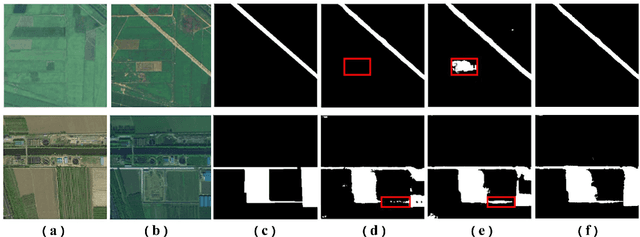
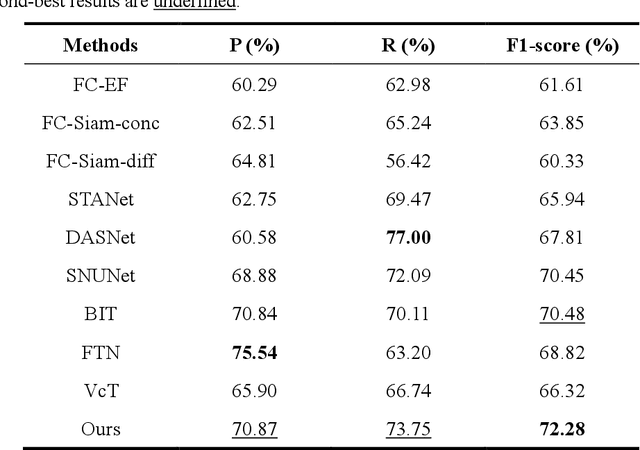
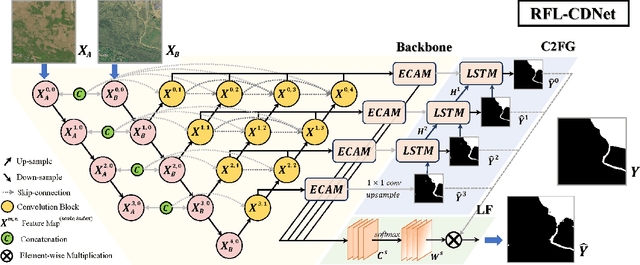
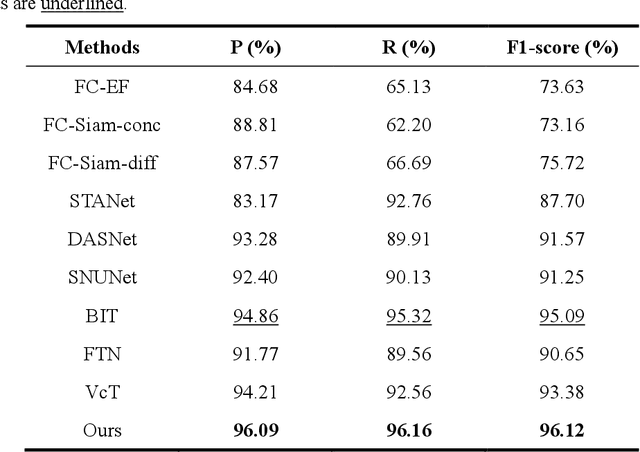
Abstract:Change Detection is a crucial but extremely challenging task of remote sensing image analysis, and much progress has been made with the rapid development of deep learning. However, most existing deep learning-based change detection methods mainly focus on intricate feature extraction and multi-scale feature fusion, while ignoring the insufficient utilization of features in the intermediate stages, thus resulting in sub-optimal results. To this end, we propose a novel framework, named RFL-CDNet, that utilizes richer feature learning to boost change detection performance. Specifically, we first introduce deep multiple supervision to enhance intermediate representations, thus unleashing the potential of backbone feature extractor at each stage. Furthermore, we design the Coarse-To-Fine Guiding (C2FG) module and the Learnable Fusion (LF) module to further improve feature learning and obtain more discriminative feature representations. The C2FG module aims to seamlessly integrate the side prediction from the previous coarse-scale into the current fine-scale prediction in a coarse-to-fine manner, while LF module assumes that the contribution of each stage and each spatial location is independent, thus designing a learnable module to fuse multiple predictions. Experiments on several benchmark datasets show that our proposed RFL-CDNet achieves state-of-the-art performance on WHU cultivated land dataset and CDD dataset, and the second-best performance on WHU building dataset. The source code and models are publicly available at https://github.com/Hhaizee/RFL-CDNet.
An End-to-end Supervised Domain Adaptation Framework for Cross-Domain Change Detection
Apr 01, 2022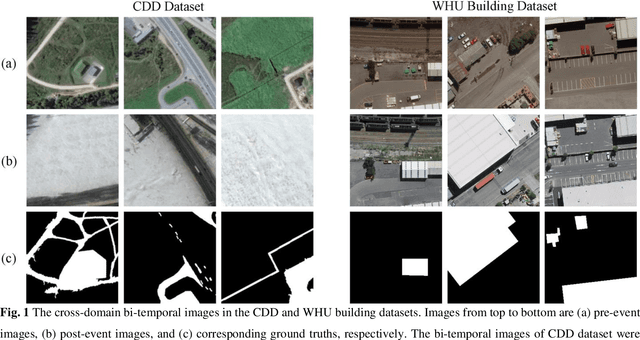
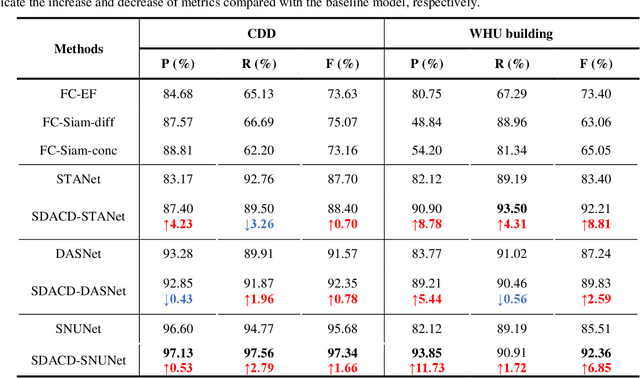
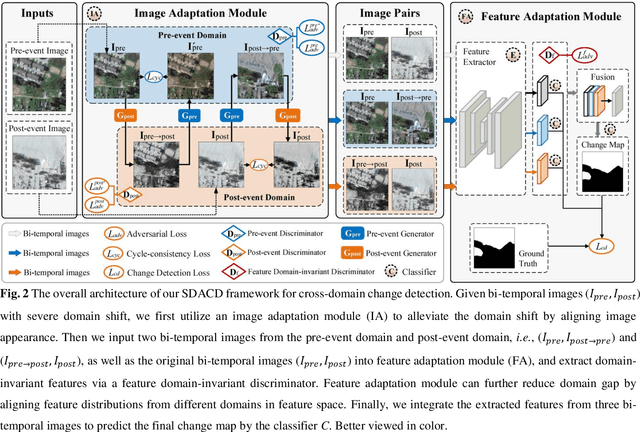
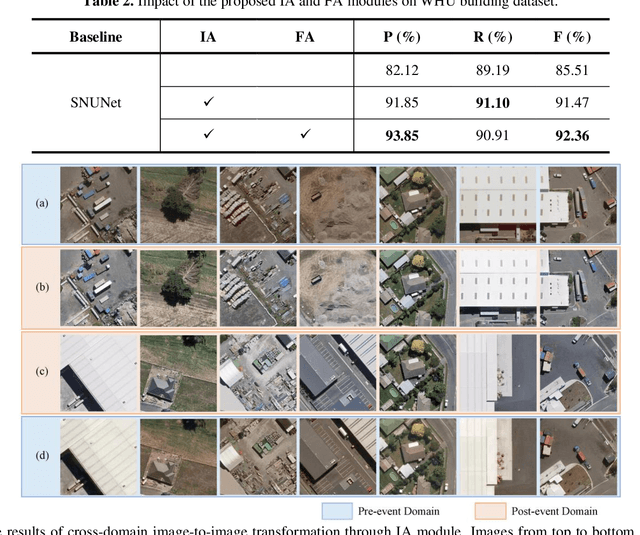
Abstract:Existing deep learning-based change detection methods try to elaborately design complicated neural networks with powerful feature representations, but ignore the universal domain shift induced by time-varying land cover changes, including luminance fluctuations and season changes between pre-event and post-event images, thereby producing sub-optimal results. In this paper, we propose an end-to-end Supervised Domain Adaptation framework for cross-domain Change Detection, namely SDACD, to effectively alleviate the domain shift between bi-temporal images for better change predictions. Specifically, our SDACD presents collaborative adaptations from both image and feature perspectives with supervised learning. Image adaptation exploits generative adversarial learning with cycle-consistency constraints to perform cross-domain style transformation, effectively narrowing the domain gap in a two-side generation fashion. As to feature adaptation, we extract domain-invariant features to align different feature distributions in the feature space, which could further reduce the domain gap of cross-domain images. To further improve the performance, we combine three types of bi-temporal images for the final change prediction, including the initial input bi-temporal images and two generated bi-temporal images from the pre-event and post-event domains. Extensive experiments and analyses on two benchmarks demonstrate the effectiveness and universality of our proposed framework. Notably, our framework pushes several representative baseline models up to new State-Of-The-Art records, achieving 97.34% and 92.36% on the CDD and WHU building datasets, respectively. The source code and models are publicly available at https://github.com/Perfect-You/SDACD.
 Add to Chrome
Add to Chrome Add to Firefox
Add to Firefox Add to Edge
Add to Edge